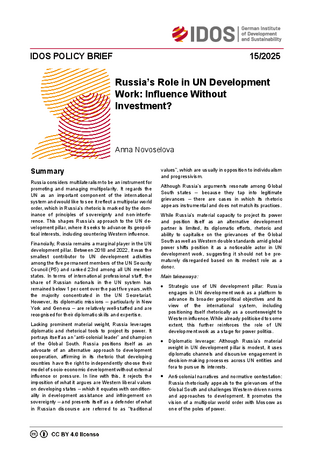Russia's role in UN development work: influence without investment?
Novoselova, AnnaPolicy Brief (15/2025)
Bonn: German Institute of Development and Sustainability (IDOS)
DOI: https://doi.org/10.23661/ipb15.2025
Russia considers multilateralism to be an instrument for promoting and managing multipolarity. It regards the UN as an important component of the international system and would like to see it reflect a multipolar world order, which in Russia’s rhetoric is marked by the dominance of principles of sovereignty and non-interference. This shapes Russia’s approach to the UN development pillar, where it seeks to advance its geopolitical interests, including countering Western influence.
Financially, Russia remains a marginal player in the UN development pillar. Between 2018 and 2022, it was the smallest contributor to UN development activities among the five permanent members of the UN Security Council (P5) and ranked 23rd among all UN member states. In terms of international professional staff, the share of Russian nationals in the UN system has remained below 1 per cent over the past five years, with the majority concentrated in the UN Secretariat. However, its diplomatic missions – particularly in New York and Geneva – are relatively well-staffed and are recognised for their diplomatic skills and expertise.
Lacking prominent material weight, Russia leverages diplomatic and rhetorical tools to project its power. It portrays itself as an “anti-colonial leader” and champion of the Global South. Russia positions itself as an advocate of an alternative approach to development cooperation, affirming in its rhetoric that developing countries have the right to independently choose their model of socio-economic development without external influence or pressure. In line with this, it rejects the imposition of what it argues are Western liberal values on developing states – which it equates with conditionality in development assistance and infringement on sovereignty – and presents itself as a defender of what in Russian discourse are referred to as “traditional values”, which are usually in opposition to individualism and progressivism.
Although Russia’s arguments resonate among Global South states – because they tap into legitimate grievances – there are cases in which its rhetoric appears instrumental and does not match its practices.
While Russia’s material capacity to project its power and position itself as an alternative development partner is limited, its diplomatic efforts, rhetoric and ability to capitalise on the grievances of the Global South as well as Western double standards amid global power shifts position it as a noticeable actor in UN development work, suggesting it should not be prematurely disregarded based on its modest role as a donor.
Main takeaways:
• Strategic use of UN development pillar: Russia engages in UN development work as a platform to advance its broader geopolitical objectives and its view of the international system, including positioning itself rhetorically as a counterweight to Western influence. While already politicised to some extent, this further reinforces the role of UN development work as a stage for power politics.
• Diplomatic leverage: Although Russia’s material weight in UN development pillar is modest, it uses diplomatic channels and discursive engagement in decision-making processes across UN entities and fora to pursue its interests.
• Anti-colonial narratives and normative contestation: Russia rhetorically appeals to the grievances of the Global South and challenges Western-driven norms and approaches to development. It promotes the vision of a multipolar world order with Moscow as one of the poles of power.


